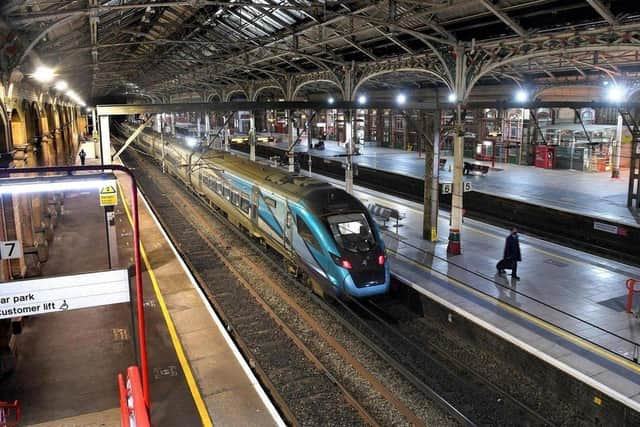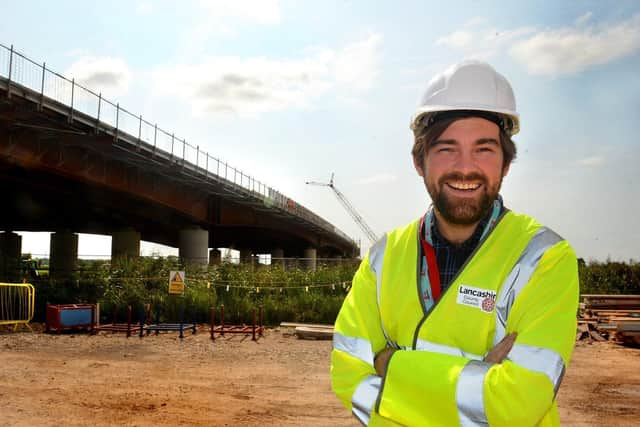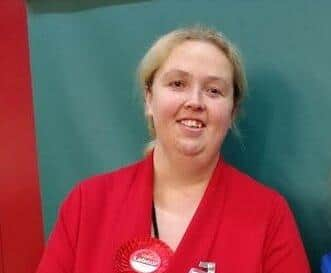Rail strikes will cause Lancashire train passengers the worst disruption in a decade amid claim that walkouts ‘hurt the the most disadvantaged'
and live on Freeview channel 276
Charlie Edwards, Lancashire County Council’s cabinet member for highways and transport, was speaking as the threat looms of a national walkout by members of the Rail, Maritime and Transport (RMT) union.
Staff working at Network Rail and 15 train operating companies voted last month to strike in a dispute over pay, jobs and safety concerns.
Advertisement
Hide AdAdvertisement
Hide AdA meeting of Transport for the North’s Rail North Committee last week heard that the proposed industrial action would cause the biggest strike-related disruption to train services in more than a decade.


No dates have yet been set for any walkouts – for which the union would have to give two weeks’ notice – but that could change on Tuesday when the RMT’s national executive committee discusses a possible timetable for pickets.
If it goes ahead, the national strike would come on top of months of action by RMT members working as conductors for TransPennine Express (TPE). They have been staging regular strikes since February in a dispute with that company over pay disparity.
Both TPE and fellow Lancashire operator Northern have also been unable to secure an agreement with members of the train drivers’ union ASLEF over so-called “rest-day working”. That means that staff are not available to work overtime on their days off, which is one of the main ways in which the firms keep up with vital employee training.
Advertisement
Hide AdAdvertisement
Hide AdCounty Cllr Edwards, a Conservative, questioned why fellow Rail North committee members – representing local authorities across the North of England – had not condemned “the actions of the trade unions”.


“For a lot of people, getting the train is the only option – in places like Lancashire – to get to work or…school.
“It is the disadvantaged [who] are most likely to suffer when the train doesn’t turn up. They don’t have a car [or] an alternative option.
“I do not think that strike action is in the best interests of the most disadvantaged people in our society, who need the train.
Advertisement
Hide AdAdvertisement
Hide Ad“As a committee, I think we should have a more robust position on the industrial action itself. We need to get back around the negotiating table – there was something in the press…that said there was a ballot…before the negotiations had [been] completed.


“I really think that we should be on the side of passengers and people – and I would like us to have a position on encouraging a way forward that doesn’t involve industrial action,” County Cllr Edwards told last Wednesday’s meeting.
However, the committee chair, Labour Liverpool city councillor Liam Robinson, said that he and others at the virtual gathering had “respectfully, got a different view”.
He added: “In the interest of trying to find consensus, I think it is best that we focus on the perspective of getting everyone round the table rather than trying to castigate individual parties.
Advertisement
Hide AdAdvertisement
Hide Ad“We’ve got to find a solution rather than adding fuel to the fire,” said Cllr Robinson.
Launching the ballot for strike action last month, the RMT told its members that they were facing “the biggest attack on your pay and working conditions for 20 years, in the middle of a cost-of-living crisis”.
Most railway staff have had their pay frozen since 2020, whilst the RMT also claims that 2,500 “safety-critical maintenance jobs” are at risk as part of what it says is a £2bn reduction in spending on the network.
Strike action was supported by 89 percent of those who voted, on a turnout of 71 percent – believed to be the biggest endorsement for a walkout by railway workers since privatisation in the mid-1990s. Along with staff at Northern and TPE, RMT members working for Avanti West Coast were also part of the ballot.
Advertisement
Hide AdAdvertisement
Hide AdThe Local Democracy Reporting Service (LDRS) approached the RMT for comment on the issues raised at the Rail North meeting regarding the prospect of a national strike, but the union responded specifically about further action planned by conductors on TransPennine Express (TPE).
In a separate statement on the threatened national walkout, issued last week, the union said that it had agreed to continue participating in industry-wide discussions – via the Rail Industry Recovery Group – to “create a framework and structure for negotiations on all issues in the dispute”.
General secretary Mick Lynch said after the ballot result that it was “a vindication of the union’s approach and sends a clear message that members want a decent pay rise, job security and no compulsory redundancies”.
“We sincerely hope ministers will encourage the employers to return to the negotiating table and hammer out a reasonable settlement with the RMT,” he added on 24th May.
Advertisement
Hide AdAdvertisement
Hide AdHowever, speaking to the LDRS after the Rail North meeting, County Cllr Edwards said he stood by his criticism of the union’s stance.
“I think it’s really important that we call out strike action as a first option. Strike action should be the last option – if at all – not before you’ve even negotiated.
“When we are trying to encourage people to get back on the railway, the unions are doing the exact opposite,” County Cllr Edwards said.
However, his Labour opposition shadow spokesperson at County Hall, Kim Snape, called on the government to “take responsibility”.
Advertisement
Hide AdAdvertisement
Hide Ad“I think it is so vital that the Department for Transport pull their head out of the sand and constructively work with the rail unions and rail operators to try [to] avoid a national strike.
“Not only do they need to be addressing the wider issues that have led to this situation – [which] have been going on for years – but I also believe it is time that instead of cutting back on services, we see [the] investment in services that we all want [in order] for Lancashire to prosper.
“We also need more incentivisation for people to use the rail service. Unfortunately, at the moment, we aren’t seeing that and it’s becoming a serious risk…whether or not your train will turn up, or if you will end up with a rail replacement bus or if your service ends up getting cancelled full stop,” County Cllr Snape said.
Network Rail route director Matt Rice said that the impact of a nationwide rail strike would be keenly felt.
Advertisement
Hide AdAdvertisement
Hide Ad“If our signalling community walk out for a day of action or a sustained period of action short of a strike – [such as] working to rule etc. – our ability to operate the network…will be significantly diminished by an order of magnitude that we have not seen for at least a decade, if [not] longer,” Mr. Rice said.
He told committee members that Network Rail was “committed to trying to reach a conclusion with the unions” in order to avert such disruption.
Tricia Williams, chief operating officer for Northern, told the Rail North committee that around 3,000 members of its staff would be involved in any national RMT strike – and said that the firm was planning for that eventuality.
“We know that the only way to resolve this dispute is through dialogue and we will encourage the RMT to join the other trade unions in discussions as soon as possible on all the matters cited.
Advertisement
Hide AdAdvertisement
Hide Ad“In the meantime, we continue to…[work] on contingency plans for multiple scenarios.”
The meeting heard that the decision of ASLEF members not to agree to rest-day working was simply their right – and not a form of industrial action.
However, Ms. Williams said that the situation nevertheless reduced Northern’s “flexibility for training”. The company had a backlog of 9,000 driver training days as of April, down from a previous peak of 12,000.
“It is impacting customers with some cancellations – and we’ve been supplementing [those] with replacement transport. We will continue to advise customers to check immediately before they travel to ensure their journeys go as smoothly as possible,” said Ms. Williams, adding that discussions were continuing in an attempt to come to an agreement with ASLEF.
Advertisement
Hide AdAdvertisement
Hide AdResponding to the issues raised in the meeting, ASLEF’s general secretary, Mick Whelan, told the LDRS that members were “incensed” that the train companies were “trying to blame train drivers for their own failures”.
“If they are cutting services because of ‘a shortage of staff’, it’s because they have – either quite deliberately or utterly ineptly – failed to recruit enough staff to run the services they have promised to deliver.
“It is as galling for staff as it is for passengers to hear an announcement that a service has been cancelled ‘due to a shortage of staff’ when we know it’s not always true.
“The companies will often blame an absence of rest-day working – drivers working overtime, on their rest days, or days off – when many haven’t even asked for a rest-day working agreement.
Advertisement
Hide AdAdvertisement
Hide Ad“What is really going on here is the planned and managed decline – and it’s deliberate – of Britain’s railways by the Transport Secretary, colluding with the train companies, under cover of claiming ‘a shortage of drivers’,” Mr. Whelan said.
Meanwhile, RMT boss Mick Lynch last week condemned what he described as the “divide and rule tactics of TPE bosses” after the firm offered drivers a pay increase of 15 percent for working on their days off – but declined to make the same concession to conductors.
At the Rail North committee, TPE managing director Matt Galton said that the firm had had recent discussions with the RMT over the strikes which have been hitting its services – principally on Sundays – in order “to see if we can resolve these issues amicably and, critically, affordably”.
“Action that continues to interrupt our delivery of services is not something that’s conducive to our recovery. We will work hard to make sure we can avoid that wherever we can,” said Mr. Galton.
Advertisement
Hide AdAdvertisement
Hide AdHe also noted that, in the six months through until last autumn, TPE had delivered the “best performance…in its history”.
A Department for Transport spokesperson said of the national walkout plans: “We are working with the rail industry to deliver a fairer service, and urge unions to join us at the negotiation table, rather than threaten harmful strikes which could drive passengers away.”